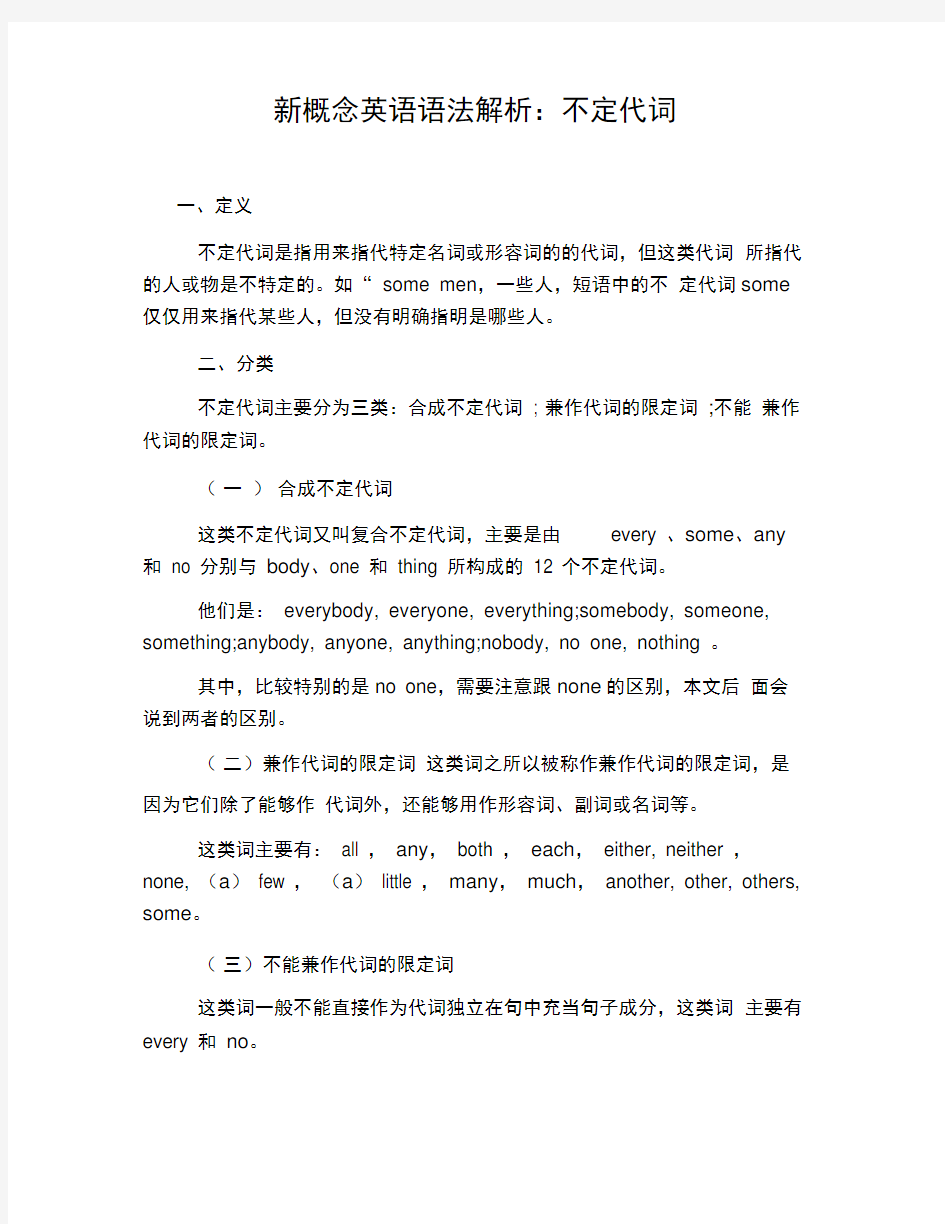

新概念英语语法解析:不定代词
一、定义
不定代词是指用来指代特定名词或形容词的的代词,但这类代词所指代的人或物是不特定的。如“ some men,一些人,短语中的不定代词some 仅仅用来指代某些人,但没有明确指明是哪些人。
二、分类
不定代词主要分为三类:合成不定代词; 兼作代词的限定词;不能兼作代词的限定词。
(一)合成不定代词
这类不定代词又叫复合不定代词,主要是由every 、some、any
和no 分别与body、one 和thing 所构成的12 个不定代词。
他们是:everybody, everyone, everything;somebody, someone, something;anybody, anyone, anything;nobody, no one, nothing 。
其中,比较特别的是no one,需要注意跟none的区别,本文后面会说到两者的区别。
(二)兼作代词的限定词这类词之所以被称作兼作代词的限定词,是因为它们除了能够作代词外,还能够用作形容词、副词或名词等。
这类词主要有:all ,any,both ,each,either, neither ,none, (a) few ,(a) little ,many,much,another, other, others, some。
(三)不能兼作代词的限定词
这类词一般不能直接作为代词独立在句中充当句子成分,这类词主要有every 和no。
三、句法功能
1、作主语
Everyone is at the party now.
Both of them like the dress.
【注意】
every 和no 不能作主语。
2、作宾语
I don't like anyone of them.
If you have any, give us some.
【注意】
every 和no 不能作宾语。
3、作表语
That's all.
I ' m not somebody; I ' m nobody.
It 's really something.
【注意】
every 和no 不能作表语。
4、作定语
Every room is clean and tidy.
Everybody 's business is nobody
s business.
5、作同位语
They both promised to come on time.
We none of us said anything.
【注意】
every 和no 不能作同位语。
四、分组详解
(一)some 与any
1、some
用于肯定句以及表示建议或期待得到肯定回答的问句。如:
We have got some potatoes.
Would you like some coffee?(希望得到肯定答复)【注意】
修饰单数名词时,意为“某个”。如:
For some reason, the airport could not be used then.
句中的some用来修饰单数可数名词reason,表示某个。所以, 上句话的意思是:
因为某种原因,机场当时没能启用。
2、any
用于否定句和疑问句时,表示“一些”。如:
He doesn't have any change.
Do you have any writing paper?
【注意】
用于肯定句时,只和单数名词或不可数名词连用,表示“任何”。如:
You can get this medicine at any chemist's.
(二)each 与every
1、each
强调个体,表示两个或两个以上中的“每一个”,在句中可充当主语、宾语、定语和同位语。如:
There are many tall trees and beautiful flowers along each side of the street.
2、every
强调整体,表示三者或三者以上中的“每一个”,只能作定语,不能说every of ,要说every one of 。如:
Every student in our class works very hard every day.
Every one of the students in our class works very hard every day.
(三)no one 与none
1、no one
意为“没有人”,只能指人,不能指物,不可与介词of 连用。
谓语动词用单数形式。当答案为没有人时,用来回答who 引导
的问句。如:
No one is able to swim across the river within fifteen minutes.
- Who is in the bedroom? - No one.
2、none
既可指人,也可指物,强调数量,意为“没有任何人或物”。
谓语动词多用单数,也可用复数,常与of 连用,通常指“三者以上的人或物中没有一个”。常用来回答how much 和how many 引导的问句。如:
None of the passengers has/have any change.
- How much beer do you have? - None.
(四) other 、the other 、another 、others 与any other
1、other 表泛指,意为“另外的、其它的”。常与复数名词或不可数名词连用。如果其前有the 、this 、some、any、each、every 、no、one 以及形容词性物主代词时,其后就可接单数名词。如:
Other workers will do the job.
I have no other place togo.
We don't like his other brother.
2、another 常用于指三者或三者以上中的“另一个”,泛指单数。可单独使用,也可后接名词。
This shirt is too big for me. Would you please get me another small one?
another 也能够后接复数名词,表示“又、再、还”。如:
He needs to stay in hospital for another four days.
3、others